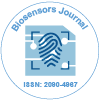Our Group organises 3000+ Global Conferenceseries Events every year across USA, Europe & Asia with support from 1000 more scientific Societies and Publishes 700+ Open Access Journals which contains over 50000 eminent personalities, reputed scientists as editorial board members.
Open Access Journals gaining more Readers and Citations
700 Journals and 15,000,000 Readers Each Journal is getting 25,000+ Readers
Indexed In
- Index Copernicus
- Google Scholar
- Genamics JournalSeek
- RefSeek
- Hamdard University
- EBSCO A-Z
- OCLC- WorldCat
Useful Links
Recommended Journals
Related Subjects
Share This Page
Electrochemical breast cancer screening technology facilitating earlier clinical diagnosis
4th International Conference on Electrochemistry
Mackenzie Honikel and Jeffrey T LaBelle
Arizona State University, USA
ScientificTracks Abstracts: Biosens J
Abstract
Statement of the Problem: Breast cancer remains the second leading cause of cancer related death among women and accounts for nearly one in three cancer diagnoses. Advances in mammography have helped improve the early detection rate; however, noninvasive imaging modalities are unable to accurately identify the molecular subtype of the disease, therefore delaying treatment until further validation. In addition, technological advancements have increased annual screening costs, segregating lower income populations from proper preventative care. To facilitate earlier diagnosis and treatment, a point-of-care (POC) electrochemical biosensor is currently being pursued to provide immediate, sensitive and specific diagnostic information. Methodology & Theoretical Orientation: Using electrochemical impedance spectroscopy (EIS) and a novel imaginary impedance algorithm a panel of biomarkers can be detected, simultaneously. Through the identification of a biomarker├ó┬?┬?s respective optimal binding frequency rapid signal acquisition is achievable, permitting signal deconvolution and robust characteristics. Findings: Currently we have validated detection of a previously FDA approved biomarker on a benchtop electrode platform revealing low limits of quantification. Upon the characterization of other breast cancer indicative biomarkers, a multiplexed POC sensor will be developed and validated in complex media and clinical samples. Additionally, a screen-printed electrode platform and novel immobilization protocol will be adopted for increased feasibility in clinical use. Conclusion & Significance: We propose that the developed technology in conjunction with electrochemical detection methodologies has profound applications in other medical conditions where a rapid diagnostic test could be useful in supplementing clinical diagnosis. Recent Publications: 1. Malkoc A, Lin C, Probst D, Honikel M and La Belle J (2017) Toward the future development of an electrochemical continuous biosensor for enhanced glycemic management. Journal of Diabetes Science and Technology 11(5):1053-1054. 2. Lin C, Pratt B, Honikel M, Jenish A, Ramesh B, Alkhan A and La Belle J (2017) Toward the development of a glucose dehydrogenase-based saliva glucose sensor without the need for sample preparation. Journal of Diabetes Science and Technology 12(1):83-89. 3. Lin C, Honikel M and La Belle J (2017) A multi-marker approach for improved glycemic management in diabetes mellitus. Journal of Diabetes, Metabolic Disorders and Control. 4(5): 00124Biography
Mackenzie Honikel is a current PhD student in the School of Biological and Health Systems Engineering at Arizona State University, mentored by Dr. Jeffrey LaBelle. She graduated from Binghamton University in May 2016 with a Bachelor’s degree in Biomedical Engineering, with a concentration in biomedical devices. Her research background is in point-of-care diagnostics and she aims to continue this work during her doctoral training. Her current research focuses on the development of a continuous, implantable sensor platform for continuous monitoring throughout the episode of care for breast cancer patients
Email:mhonikel@asu.edu

 Spanish
Spanish  Chinese
Chinese  Russian
Russian  German
German  French
French  Japanese
Japanese  Portuguese
Portuguese  Hindi
Hindi